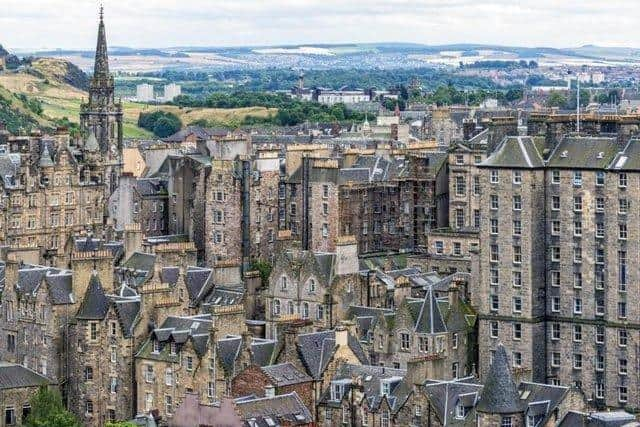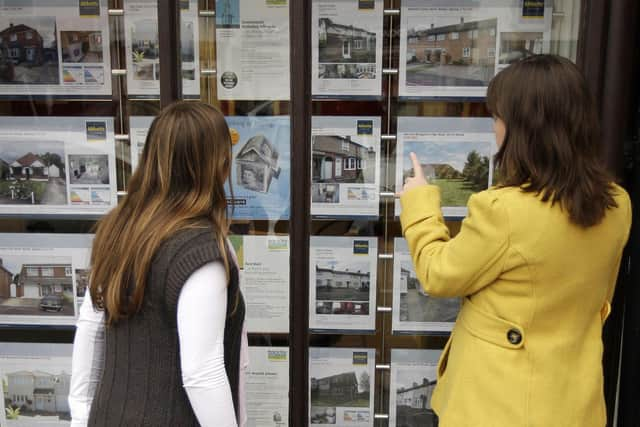New figures reveal tenth of private flats in Edinburgh owned by ‘super landlords’ amid growing fears about soaring rents
and live on Freeview channel 276
The Evening News can reveal that 15 registered landlords own around 5,300 private rented properties in Edinburgh - about nine per cent of the private rented sector.
One landlord owns 1,010 properties while over a dozen own more than a hundred properties each, according to a freedom of information request (FOI).
Advertisement
Hide AdAdvertisement
Hide AdThe vast majority of tenants in 60,000 private rented sector homes in Edinburgh live in House of Multiple Occupancy (HMO) properties.


‘Super landlords’ own more than a quarter of HMO properties too, with 26 per cent owned by just a dozen operators who own more than 50 properties each.
The figures have prompted fresh calls from politicians and leading charity Shelter for action to tackle soaring rents in the private rented sector and more affordable homes to be built.
Tommy Sheppard MP said: “Private rented homes can bring in big profits. We need more of an investigation into the private rented sector and these ‘super’ landlords. We need to know more about who they are. The council and government needs to look at this in more detail.”
Advertisement
Hide AdAdvertisement
Hide AdHe added that there was an opportunity to solve the problem and lessen the load on renters if councillors and politicians worked together with the landlords.


“If there are super landlords there’s potentially an argument for ‘super’ regulation,” he said. “There’s also an opportunity here to work with these landlords to drive up standards and make renting fairer and more affordable.
“The bottom line is we don’t have enough homes. There’s a case here for looking at a requirement for a percentage of private rented properties to be affordable, in the way that developers have to do for new builds.”
It comes after a study revealed that almost half of Edinburgh’s population can’t afford to rent, sparking fresh fears over ‘out of control’ rent hikes.
Advertisement
Hide AdAdvertisement
Hide AdCouncil tenants have their rents frozen for the second year, in response to what councillors called the “unprecedented” cost of living crisis.
But private rents saw the average cost for a one bed property skyrocket from £520 in 2010 to £755 in 2021 – almost double the national cumulative increase over that period.
Experts warn high demand coupled with a lack of available properties on the market could see private rents rise again in the first quarter of 2022.
Significant demand for homes is forcing desperate tenants to scramble to get a foot in the door – with homes in some areas taking less than a week to find a tenant after being listed for lease.
Advertisement
Hide AdAdvertisement
Hide AdYvonne King, of King Sisters Lettings, said: “There is a crisis because there’s not enough properties to meet demand. Rent rates came down during Covid then when students got notice to return to their courses in September last year it went crazy. We were inundated. It forced rent rates up.
"We had a one bed flat in Leith going for £700 and it’s now £850. Rents are going up partly because of a jump in sales prices. But there’s an economic equilibrium.
"If only a small number of individuals own many properties it does means that stake allows them more control in helping set market rates for rent.”
Estate agent Lindsays published figures recently showing the average cost of buying a home in the Capital broke through the £300,000 mark for the first time.
Advertisement
Hide AdAdvertisement
Hide AdFurthermore, research by online letting platform CityLets found housing stock levels had fallen by up to two thirds in the space of three years, sparking fresh fears about a shortfall.
Lothian MSP, Miles Briggs, said: “People across the capital are struggling to find affordable rental properties with prices going up due to high demand.
“We need to see higher levels of funding from SNP Ministers for affordable housing, so that people are not being priced out of the property market.
“Edinburgh Council could be doing more to get empty properties on the market, such as providing grants so that empty houses can be made habitable again."
Advertisement
Hide AdAdvertisement
Hide AdThe rise in short term lets like Airbnb has also had a knock-on effect, making fewer properties available for tenants living in the city.
Figures show that in the city centre and some parts of the north of the city, short term lets have reduced homes available by some 30 per cent.
Director of Shelter Scotland, Alison Watson, said: “Every day we see more and more evidence that Scotland is in the grip of a housing emergency.
“Living in unaffordable or insecure accommodation is an exhausting, damaging, way to live that is harming communities throughout Edinburgh.
Advertisement
Hide AdAdvertisement
Hide Ad“The best way out of this emergency is to urgently increase the supply of social homes. Doing so will lift a huge weight from the shoulders of people across the capital, tackle the root causes of poverty and reduce inequality.”
Councillor Kate Campbell, Edinburgh's housing, homelessness and fair work convener, added: “We face incredible pressure on housing supply in Edinburgh which is one of the key factors causing high rents.
“That’s why we have committed to building 20,000 affordable homes by 2027, why we are continuing to work on building the case for a rent pressure zone and why we’ve worked so hard to bring about regulation of short term lets.
“All short term lets will now need a licence making them much easier to control in terms of overall impact on our housing supply. We’ll also be considering greater planning controls at committee, which is another positive step in the right direction to resolving the issues short term lets are creating for residents across the city.”
A message from the Editor:
Thank you for reading this article. We're more reliant on your support than ever as the shift in consumer habits brought about by Coronavirus impacts our advertisers.
If you haven't already, please consider supporting our trusted, fact-checked journalism by taking out a digital subscription.
Comment Guidelines
National World encourages reader discussion on our stories. User feedback, insights and back-and-forth exchanges add a rich layer of context to reporting. Please review our Community Guidelines before commenting.
